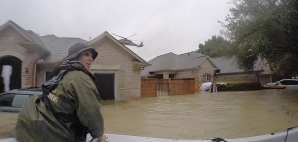Freshwater
Research Area block
More than one billion people lack safe drinking water, and freshwater is being depleted rapidly.

The Stanford Woods Institute is finding practical ways to meet growing demand for freshwater, both in developed and developing nations, including the use of recycled water and water resources. Stanford researchers are also looking at ways to protect groundwater, restore degraded waterways, improve water-use efficiency and reduce the impact of agriculture and other land uses on water systems.
Research Centers and Programs

Global Freshwater Initiative »
Building on water supply research conducted in India and Mexico, Global Freshwater Initiative researchers are developing strategies to promote the long-term viability of freshwater supplies for people and ecosystems threatened by climate change, shifts in land use, increasing population and decaying infrastructure.

Water in the West »
The western United States needs water systems that are sustainable from economic, ecological, political, institutional, equitable, scientific and legal points of view. The American West is an arid region to begin with explosive growth and increased drought are creating a water crisis. Research can help solve this crisis, but research...

Water, Health & Development »
Working with partners in Asia, Africa and the Caribbean, Stanford researchers with the Program on Water, Health & Development are identifying ways to improve and increase the sustainability of water supply and sanitation service delivery, while also enhancing capacity for sustainable water and wastewater management in developing countries.
Other Research Centers and Programs
Environmental Venture Projects
Realizing Environmental Innovation Program
News & Press Releases

Stanford Experts on Hurricane Harvey Impacts »
Stanford experts comment on how climate change and infrastructure planning contribute to the severity of impacts from extreme weather events like Hurricane Harvey.
By Devon Ryan,
View More News & Press Releases
Media Coverage
Manganese in Underground Drinking Water is Cause for Concern »
Scott Fendorf co-contributor in study that looks into potentially high and dangerous levels of manganese in U.S. Glacial Aquifer and 3 Asian countries.
By Sarah Nightingale,


